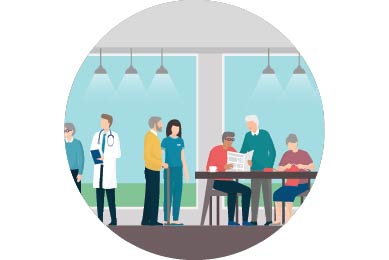Important update: Healthcare facilities
CDC has updated select ways to operate healthcare systems effectively in response to COVID-19 vaccination.
Learn more
Find the latest information:
Recommendations for Fully Vaccinated People
COVID-19 Homepage
Recommendations for Fully Vaccinated People
COVID-19 Homepage
UPDATE
Given new evidence on the B.1.617.2 (Delta) variant, CDC has updated the guidance for fully vaccinated people. CDC recommends universal indoor masking for all teachers, staff, students, and visitors to K-12 schools, regardless of vaccination status. Children should return to full-time in-person learning in the fall with layered prevention strategies in place.
UPDATE
The White House announced that vaccines will be required for international travelers coming into the United States, with an effective date of November 8, 2021. For purposes of entry into the United States, vaccines accepted will include FDA approved or authorized and WHO Emergency Use Listing vaccines. More information is available here.
UPDATE
Travel requirements to enter the United States are changing, starting November 8, 2021. More information is available here.
COVID-19 Vaccines for Long-term Care Residents
COVID-19 Vaccines for Long-term Care Residents
What You Need to Know
- CDC recommends everyone, including people who live and work in Long-term Care (LTC) settings, stay up to date with COVID-19 vaccines for their age group:
- Everyone 6 years and older
- Children aged 6 months – 5 years
- People more likely to get very sick from COVID-19 can get additional updated COVID-19 vaccines. Learn more about additional doses.
- People who live in LTC settings must give consent, or agree to getting a COVID-19 vaccine.
- COVID-19 vaccines are free.
If you live or work in a Long-term Care (LTC) setting, you can help protect yourself and the people around you by staying up to date with your COVID-19 vaccines.

- COVID-19 vaccines are safe and effective—especially against becoming seriously ill, being hospitalized and dying—and very important for older adults.
- Older adults and people with certain health conditions are more likely to get very sick from COVID-19.
- COVID-19 vaccines can help keep you from getting seriously ill if you do get COVID-19.
If your loved one is not able to ask questions or otherwise communicate with the LTC staff, here’s what to know about consent for getting a COVID-19 vaccine:
- Consent or assent for a COVID-19 vaccine is given by LTC residents (or people appointed to make medical decisions on their behalf called a medical proxy) and documented in their charts per the provider’s standard practice.
- Residents who receive a COVID-19 vaccine (or their medical proxy) also receive a fact sheet before vaccination. The fact sheet explains the risks and benefits of COVID-19 vaccination.
- Some COVID-19 vaccination providers may require written, email, or verbal consent from recipients before getting vaccinated. This is at the provider’s discretion; written consent is not required by federal law for COVID-19 vaccination in the United States (U.S.).
- Residents (or their medical proxies) get a vaccination card or printout that tells them which COVID-19 vaccine they received and the date they received it. If their vaccine card is full, the vaccine provider can give them another card. This should also be recorded in their medical chart.
Safe, Easy, Free, and Nearby COVID-19 Vaccination
COVID-19 vaccines are free of charge to all people living in the U.S., regardless of their immigration or health insurance status.
How to Get a COVID-19 Vaccine
Take these steps to get a COVID-19 vaccine for you or your family member:
- Talk with the LTC staff about getting vaccinated on site.
- Ask a family member or friend to help you schedule a vaccination appointment if you can’t get vaccinated on site. Visit vaccines.gov to find providers near you.
- If you have additional questions about how to get a COVID-19 vaccine, talk with your healthcare provider.
To find COVID-19 vaccine locations near you: Search vaccines.gov, text your ZIP code to 438829, or call 1-800-232-0233.
For Healthcare Workers